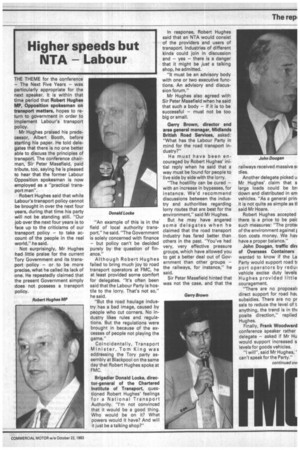Higher speeds but NTA Labour
Page 29

If you've noticed an error in this article please click here to report it so we can fix it.
THE THEME for the conference — The Next Five Years — was particularly appropriate for the next speaker. It is within that time period that Robert Hughes MP, Opposition spokesman on transport matters, hopes to return to government in order to implement Labour's transport policy.
Mr Hughes praised his predecessor, Albert Booth, before starting his paper. He told delegates that there is no one better able to discuss the principles of transport. The conference chairman, Sir Peter Masefield, paid tribute, too, saying he is pleased to hear that the former Labour Opposition spokesman is now employed as a "practical transport man".
Robert Hughes said that while Labour's transport policy cannot be brought in over the next four years, during that time his party will not be standing still. "Our job over the next four years is to face up to the criticisms of our transport policy — to take account of the people in the real world," he said.
Not surprisingly, Mr Hughes had little praise for the current Tory Government and its transport policy — or to be more precise, what he called its lack of one. He repeatedly claimed that the present Government simply does not possess a transport policy. "An example of this is in the field of local authority transport," he said. "The Government is solely concerned with finance — but policy can't be decided purely by the question of finance."
Although Robert Hughes failed to bring much joy to road transport operators at FMC, he at least provided some comfort for delegates. "It's often been said that the Labour Party is hostile to the lorry. That's not so," he said.
"But the road haulage industry has a bad image, caused by people who cut corners. No industry likes rules and regulations. But the regulations were brought in because of the excesses of people not playing the game."
Coincidentally, Transport Minister, Tom King was addressing the Tory party assembly at Blackpool on the same day that Robert Hughes spoke at FMC.
powers would it have? And wi
Brigadier Donald Locke, director-general of the Chartered Institute of Transport, questioned Robert Hughes' feelings for a National Transport Authority. "I'm not convinced that it would be a good thing. Who would be on it? Whatll
it just be a talking shop?" In response, Robert Hughes said that an NTA would consist of the providers and users of transport. Industries of different kinds could join in discussion and — yes — there is a danger that it might be just a talking shop, he admitted.
"It must be an advisory body with one or two executive functions. An advisory and discussion forum."
Mr Hughes also agreed with Sir Peter Masefield when he said that such a body — if it is to be successful — must not be too big or small.
Gerry Brown, director and area general manager, Midlands British Road Services, asked: "What has the Labour Party in mind for the road transport industry?"
He must have been encouraged by Robert Hughes' initial reply when he said that a way must be found for people to live side by side with the lorry.
"The hostility can be cured — with an increase in bypasses, for instance. We'd recommend discussions between the industry and authorities regarding lorry routes that are best for the environment," said Mr Hughes.
But he may have angered some delegates when he claimed that the road transport industry has fared better than others in the past. "You've had very, very effective pressure groups, which have allowed you to get a better deal out of Government than other groups — the railways, for instance," he said.
Sir Peter Masefield hinted that was not the case, and that the railways received massive si dies.
Another delegate picked u Mr Hughes' claim that s large loads could be bn down and distributed in sm vehicles. "As a general prini it is not quite as simple as ti said Mr Hoare.
Robert Hughes accepted there is a price to be oak such measures: "The prates of the environment against r tion costs money. We hay have a proper balance."
John Dougan, traffic dill of Overseas Containers wanted to know if the La Party would support road tr port operators by redug vehicle excise duty levels Hughes provided little couragement.
"There are no proposalt direct support for road hat.. subsidies. There are no pr sals to reduce the level of t. anything, the trend is in tilt posite direction," replied Hughes.
Finally, Frank Woodward conference speaker rather delegate — asked if Mr Hu would support increased s levels for goods vehicles.
"I will", said Mr Hughes,' can't speak for the Party."
































































































